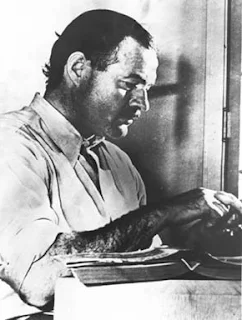Ernest Hemingway (1899-1961)
Ernest Miller Hemingway (July 21, 1899 – July 2, 1961) was an American author and journalist. His economical and understated style had a strong influence on 20th-century fiction, while his life of adventure and his public image influenced later generations. Hemingway produced most of his work between the mid-1920s and the mid-1950s, and won the Nobel Prize in Literature in 1954. He published seven novels, six short story collections and two non-fiction works. Three novels, four collections of short stories and three non-fiction works were published posthumously. Many of these are considered classics of American literature.[1]
Hemingway was raised in Oak Park, Illinois. After high school he reported for a few months for The Kansas City Star, before leaving for the Italian front to enlist with the World War I ambulance drivers. In 1918, he was seriously wounded and returned home. His wartime experiences formed the basis for his novel A Farewell to Arms. In 1922, he married Hadley Richardson, the first of his four wives. The couple moved to Paris, where he worked as a foreign correspondent, and fell under the influence of the modernist writers and artists of the 1920s "Lost Generation" expatriate community. The Sun Also Rises, Hemingway's first novel, was published in 1926.
After his 1927 divorce from Hadley Richardson, Hemingway married Pauline Pfeiffer. They divorced after he returned from the Spanish Civil War where he had acted as a journalist, and after which he wrote For Whom the Bell Tolls. Martha Gellhorn became his third wife in 1940. They separated when he met Mary Welsh in London during World War II; during which he was present at the Normandy Landings and liberation of Paris.
Shortly after the publication of The Old Man and the Sea in 1952, Hemingway went on safari to Africa, where he was almost killed in a plane crash that left him in pain or ill-health for much of the rest of his life. Hemingway had permanent residences in Key West, Florida, and Cuba during the 1930s and 1940s, but in 1959 he moved from Cuba to Ketchum, Idaho, where he committed suicide in the summer of 1961.
Quotes·Quotation by Ernest Hemingway
¶ Man is not made for defeat. A man can be destroyed but not defeated. [The Old Man and the Sea]
¶ We are all apprentices in a craft where no one ever becomes a master. [New York Journal-American]
¶ We do not find the deep truths of life; they find us. [Advice to a young man ‘Playboy']
¶ The world breaks everyone and afterward many are strong at the broken places. But those that will not break it kills. It kills the very good and the very gentle and the very brave impartially. If you are none of these you can be sure it will kill you too but there will be no special hurry. [“A Farewell to Arms” Ch. 34]
¶ This wine is too good for toast-drinking, my dear. You don't want to mix emotions up with a wine like that. You lose the taste. [“The Sun Also Rises” in Book 1, Ch. 7]
¶ Happiness in intelligent people is the rarest thing I know. [“The Garden of Eden” Ch. 11]
¶ If we win here we will win everywhere. The world is a fine place and worth the fighting for and I hate very much to leave it. [“For Whom the Bell Tolls ” Ch 43]
¶ Never think that war, no matter how necessary, nor how justified, is not a crime.
¶ They wrote in the old days that it is sweet and fitting to die for one's country. But in modern war, there is nothing sweet nor fitting in your dying. You will die like a dog for no good reason.
Writing·Reading
¶ A writer should write what he has to say and not speak it. [Nobel Prize Speech]
Images
 |
| Hemingway working on For Whom the Bell Tolls at the Sun Valley Lodge, 1939 |
[1] https://en.wikipedia.org/wiki/Ernest_Hemingway
